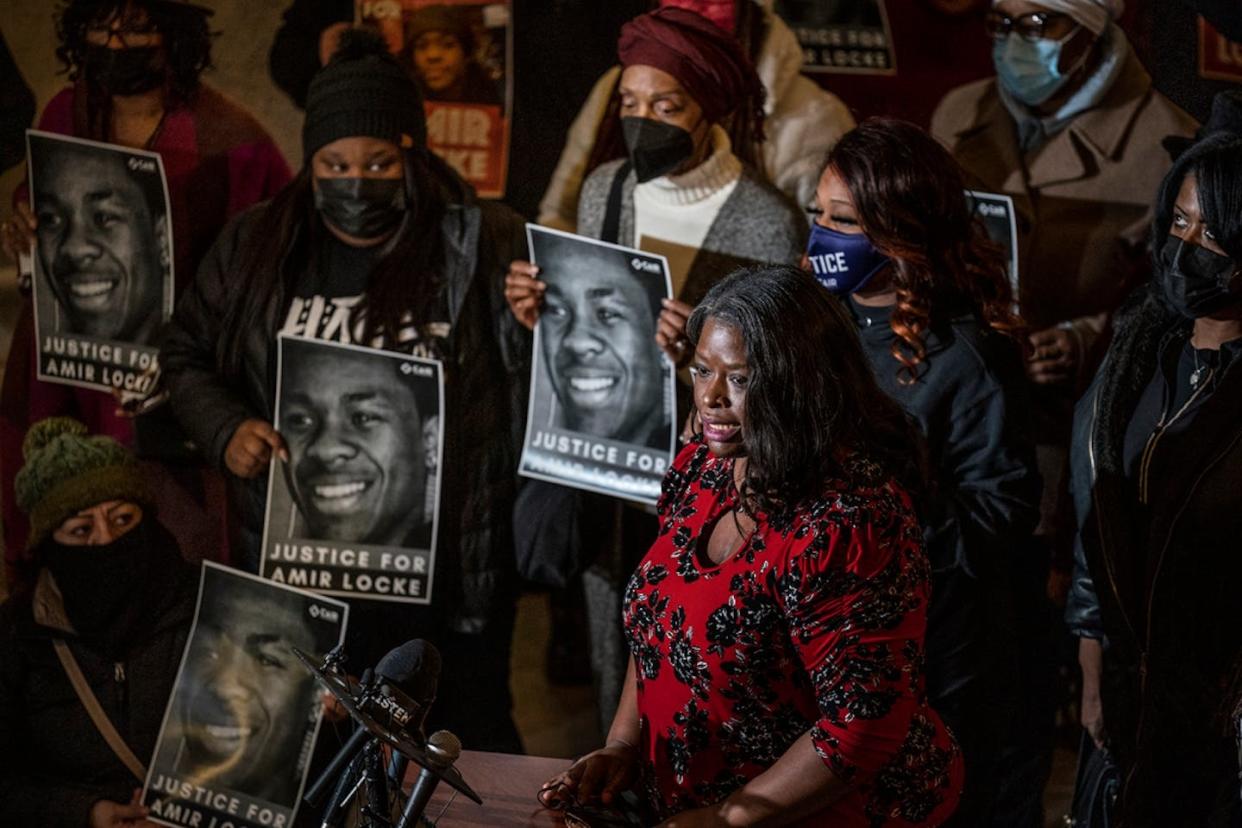Judge says lawsuit can proceed against Minneapolis SWAT officer who killed Amir Locke

- Oops!Something went wrong.Please try again later.
A federal judge says a lawsuit can move forward alleging a Minneapolis SWAT officer and the city are liable for constitutional violations in the killing of Amir Locke during a no-knock warrant search in February 2022.
Attorneys for the city and officer Mark Hanneman sought to dismiss the civil suit in a motion filed last fall, saying Hanneman acted reasonably when he shot Locke three times during a pre-dawn raid because he believed "Locke represented an immediate threat of death or serious physical harm." The city attorney also argued the officer was entitled to qualified immunity, the legal principle that protects government workers from civil liability when acting in the course of duty.
In denying the city's motion Monday, U.S. District Judge Eric Tostrud wrote that the body-camera footage doesn't conclusively show that deadly force was warranted during the unannounced search, and the lawsuit "alleges facts plausibly showing that Officer Hanneman's use of force violated Amir's clearly established Fourth Amendment rights."
Two months after the shooting, then-Hennepin County Attorney Mike Freeman and Minnesota Attorney General said there would be no criminal charges against Hanneman, saying that although Locke was a victim, there was not enough evidence to prove beyond a reasonable doubt that the officer violated Minnesota's use-of-force statute.
Ben Crump, the civil rights attorney representing Locke's parents, said in a statement: "This ruling marks a critical step forward in the pursuit of accountability and justice for Amir Locke and his family. While neither we nor Amir's family had control over the prosecution of criminal charges, this Order now gives us the ability to fully conduct discovery into the City of Minneapolis and ensure that every stone is turned over in Amir's name. He was a promising and positive young musician who wanted to use his life to inspire young people in the Black community and beyond. The practices of the Minneapolis Police Department in February 2022 reflect systemic issues within the department that disproportionately impact minority communities and undermine public trust in law enforcement."
The City Attorney's Office is reviewing the order, said Minneapolis spokesperson Jess Olstad. "This was a motion filed at the early stages of litigation, and the litigation will continue," she said.
Hanneman and the Minneapolis SWAT team stormed into the Bolero Flats apartment building downtown on Feb. 2, 2022, in search of evidence related to a St. Paul homicide investigation. An officer's body-camera recording showed police quietly unlocking the apartment door with a key before barging inside and yelling, "Search warrant!" as Locke lay under a blanket on the couch. When an officer kicked the couch, Locke stirred and emerged holding a pistol in his right hand.
Hanneman fired three times, hitting Locke in the face, chest and arm.
The killing of Locke, a Black man, brought renewed scrutiny to the practice of no-knock warrants — those that permit police to enter a residence without announcing themselves, intended for high-risk searches. In this case, St. Paul police had originally asked for a standard warrant, but the Minneapolis SWAT team insisted it be a no-knock operation.
Minneapolis had restricted the use of the unannounced raids a year earlier as part of a series of reforms made in the wake of George Floyd's death. At the time, Mayor Jacob Frey said he banned no-knock warrants for "all but exigent circumstances." Yet it continued to be a common practice in Minneapolis; police conducted 87 of them after the policy change.
Locke, a DoorDash delivery driver and aspiring rapper who legally possessed the gun, was not the subject of the search warrant and had no criminal record.
The lawsuit, filed on behalf of his parents, alleges the no-knock warrant that resulted in his death is consistent with the city's "custom, pattern and practice of racial discrimination in policing."
"Any reasonable officer would have understood that Amir needed an opportunity to realize who and what was surrounding him, and then provide Amir with an opportunity to disarm himself," the suit reads. "Hanneman failed to give Amir any such opportunity. … Instead, Hanneman fired three shots while Amir was still covered in a blanket on a couch where Amir had been resting peacefully only 10 seconds before the SWAT entry."
Locke never raised the weapon in the direction of any officer or placed his finger on the trigger, the lawsuit says.
Star Tribune staff writer Liz Sawyer contributed to this story.

